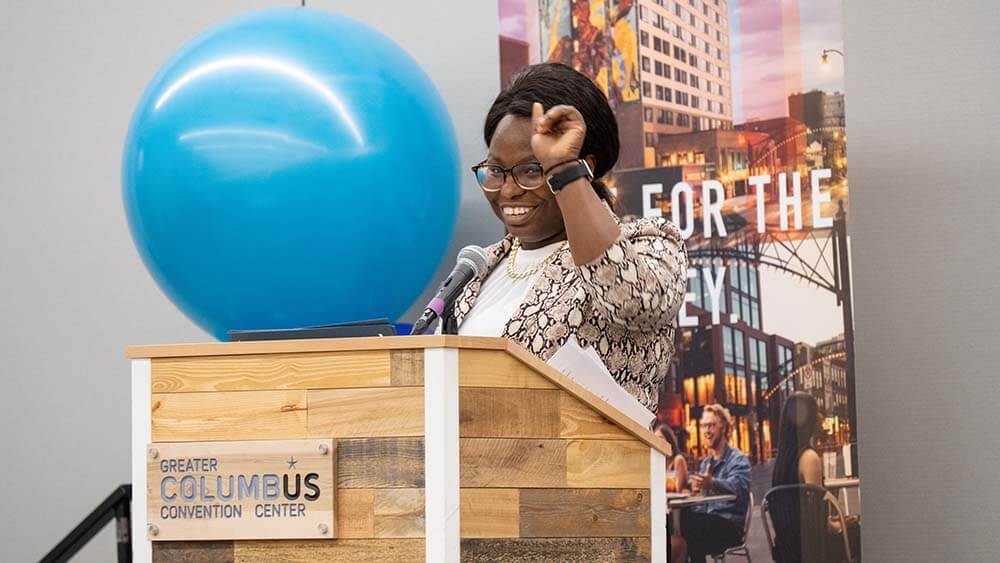
Efua Amissah-Aggrey, the first graduate of Columbus’ Diversity Apprenticeship Program, speaks at a luncheon after completing her apprenticeship. She now works as the customer experience programs coordinator at the Columbus Regional Airport Authority. (Courtesy Experience Columbus)
Before Shannon Jones became the director of diversity, equity, and inclusion programming for Experience Columbus, she worked in education, earning a Ph.D. in higher education from Ohio State University. As part of her academic research, she looked at the factors that influenced racial literacy among white faculty members in higher education. The most important characteristic of those who were more racially literate was not tied to influences such as education level, Jones discovered. “The No. 1 finding was that instructors who were racially literate or more racially literate had proximity to people of color,” she told Convene. “They had a boss that was a person of color. They had colleagues that were people of color. They had friends that were people of color.”

Shannon Jones
Research on diversity training programs conducted by Columbia University sociologists David Stark and Sheen S. Levine yielded similar results — their study compared the effect of describing fictional Black peers as highly skilled and intelligent to white individuals while directly exposing them to Black individuals as they solved problems. Watching excellence demonstrated as opposed to hearing about it had a profound impact on decreasing white participants’ biases, the researchers said in a story in Columbia Magazine. “It is not enough, the researchers say,” wrote the author, “for companies to simply facilitate conversations among their employees about unconscious racial biases. Rather, companies need to ensure that white workers have regular and sustained interaction with Black colleagues.”
Those kinds of findings help fuel Jones’ passion for the Diversity Apprenticeship Program in Columbus, whose aim is to put more people of color into management positions in the hospitality and travel sector, including events. The award-winning program graduated its first cohort of five apprentices in March, all of whom were offered full-time, manager-level jobs at organizations including Experience Columbus, the Columbus Regional Airport Authority, the Greater Columbus Convention Center, and the Hyatt Regency Columbus.
The program’s success is partly due to timing, Jones said. Experience Columbus Director Brian Ross heard Tourism Diversity Matters Director Greg Shields speak amid what Jones called 2020’s racial reckoning after the murder of George Floyd. “People of color and certain other subgroups always knew that the travel industry was not as diverse as it needed to be,” Jones said, “and that the diversity that did exist really was entry-level positions and the higher you went up into organizations, the more white and male they became. But I think, obviously, 2020 kind of put a spotlight on some of those inequities.”
Another big factor in its success is the broad and significant support the program has found in the community, including grants from city and county governments and the nonprofit Columbus Foundation, Jones said. “We’ve just been so lucky to have a community here in Columbus that is really getting behind this initiative,” Jones said, not only financially, but through community members who are “personally and morally invested in the initiative.”
The framework for the apprentice program, which was created by Tourism Diversity Matters, now part of U.S. Travel Association, was designed for one or two apprentices but can be customized for destinations, Jones said. In Columbus, that meant scaling the program up — way up. In addition to the five graduates now working in the community, a second cohort is underway, and a third cohort is in the application process — 13 different host sites have participated in the program, with a goal of graduating 36 managers over the next two years.
For Jones, the goal of expanding equity because it’s the right thing to do should be enough for people, she said, but there’s a business case to be made. “Organizations do not know what they’re missing out on by not having people of color around the table, making decisions — there’s just high value in having people of color help drive business initiatives.”
LEARN MORE: In April, Experience Columbus’ Diversity Apprenticeship Program was named a PRNEWS Social Impact Award winner.
Barbara Palmer is deputy editor of Convene.
